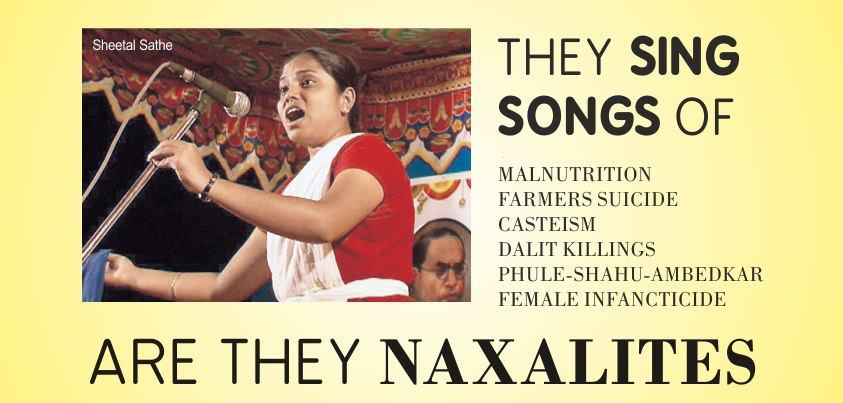When Poetry Is Held Unlawful... JTSA In Solidarity With Artists And Poets Of Kabir Kala Manch
By Jamia Teachers’ Solidarity Association
23 April, 2015
Countercurrents.org

On April 10, 2015 Bombay High court refused bail to Sachin Mali, Sagar Gorkhe and Ramesh Gaichor of Kabir Kala Manch (KKM), who have remained in jail for two years without a trial. They are not charged with committing violence, or possessing weapons or contraband; it was their singing and their songs that were found unlawful. The KKM poets and artists had been forced to go into hiding in 2011 following the arrest and torture of two of their members by the Anti-Terrorist Squad (ATS). They were charged with collaborating with Naxalites; their art was branded ideologically Maoist. In January 2013, the two arrested members of KKM were given bail which prompted Sachin, Sagar, Ramesh and Sheetal Sathe to come out of hiding. In April 2013 the four sang in front of the Maharashtra Assembly in a peaceful, musical satyagraha and were arrested. Since then, Sheetal Sathe has got bail.
In its order, the Bombay High Court found no merit in the bail application and denied bail to the three applicants merely because ‘they are charged for offence under the Unlawful Activities (Prevention) Act’. As if being charged of a crime is in itself the proof of guilt. Denying bail on grounds of the accusations alone amounts to a perversion of the first principle of justice -- that one is innocent until proven guilty. JTSA has, in fact, documented many cases where under-trials charged with the most heinous crimes have spent years in jail, only to be acquitted later. In our view, the denial of bail in this case is in line with the way the UAPA has been unleashed by the State over people to silence any dissent and to instill fear into all of us.
The entire KKM case is a story of hounding of a group of Ambedkarite artists and poets performing for those people who the powerful think have no use of art; indeed have no claim to humanity. To be sure, it is not the first instance of its kind when poetry in defence of the powerless has been held to be illegal. Neither is it the first time when artists have been held criminal for producing art. Poets like Pablo Neruda, Faiz Ahmed Faiz, Fredrico Garcia Lorca, Nazim Hikmet have been hounded by repressive regimes. In India, we appear to have reached the stage when the recital of life as it is, has become a criminal act that must be brutally silenced. The UAPA by including within its definition of an ‘unlawful activity’ as “any action taken by individual or association (whether by committing an act or by words, either spoken or written, or by signs or by visible representation or otherwise)”, institutionalizes the silencing of art that speaks of life, and every thought and idea that challenges the dominant narratives of caste and social inequality. Even though the Bombay High Court while granting bail to four members of KKM in 2013 had unequivocally held that mere membership of banned organizations cannot be grounds for incarceration, nor can speaking, writing or singing about socio-economic injustices be criminalized – it even held section 20 of UAPA to be in conflict with Article 19 of the Indian Constitution – in reality, on the ground, UAPA is invoked regularly to intimidate and jail those who dissent.
JTSA expresses solidarity with poets and artists of Kabir Kala Manch who participate in people’s struggles by writing and singing about structural and caste violence. We laud their role as the voice of the voiceless. We condemn the gagging of their art whose content is made up of the most common concerns of humanity. We assert that their role is to not just sympathise eloquently with people’s plight but that their voice is an appeal to the conscious of the wider society. To suppress this voice is the worst form of oppression.
Released by Jamia Teachers’ Solidarity Association
23 April 2015.
Tags
Jamia Teachers’ Solidarity Association
.
Comments are moderated

